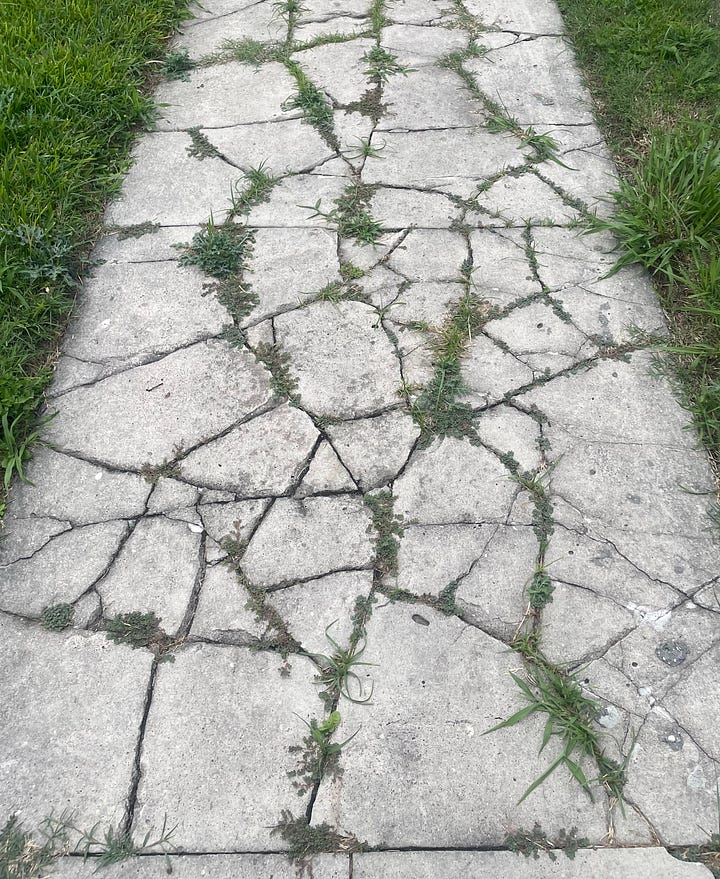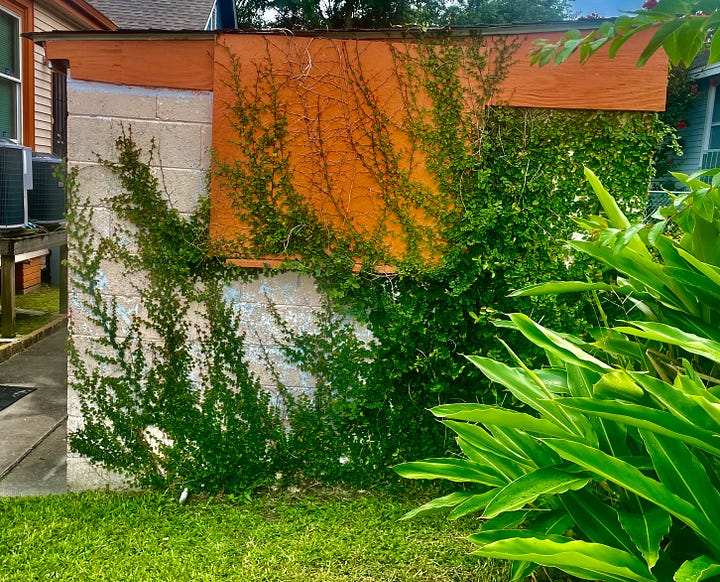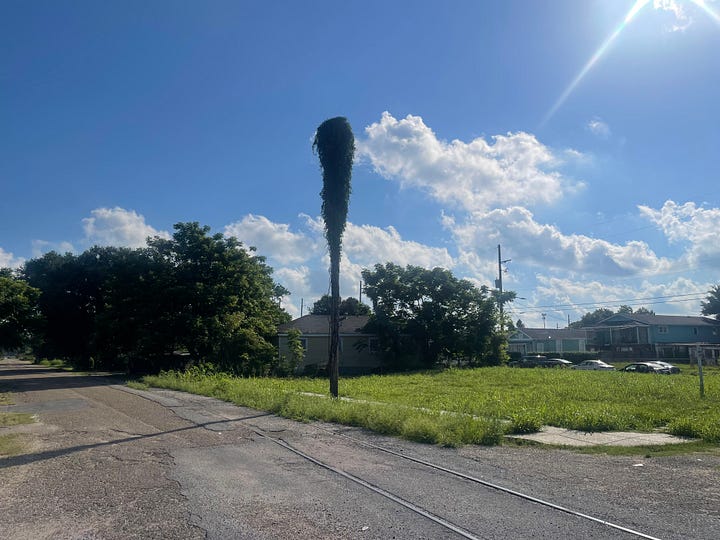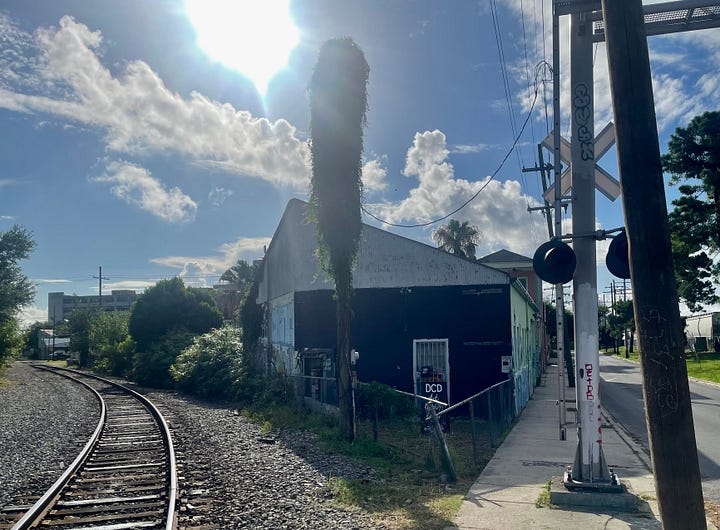Weedworks
TAoN No. 164: Sneaky, gritty, beautiful. Plus a new Rompighiaccio (Icebreaker) and a 25% off sale
One of my personal favorites among the prompts in the TAoN book is “Make It Art.” I’ve written about this a couple of times in the newsletter, too. Here’s the basic challenge (or invitation):
Think of some regular walk or drive or ride you experience often, or even that you’re experiencing for the first time. Imagine yourself a curator. Decide what, among the things you notice, you might declare public works of art.
I’ve been thinking about this example of imaginative engagement again in the context of nature — specifically, weeds.
Weeds have come up here before.1 But lately I’ve been appreciating their accidental aesthetic value: appealing patterns in cracked sidewalks, inadvertently picturesque manifestations on walls, etc.


To be specific, I’ve been pondering an out-of-commission utility pole in my neighborhood that’s become overgrown, from the top, with some uninvited greenery. (Cat’s Claw?) That’s it on the left below. I think it’s beautiful!


And most recently, on a bike ride, I noticed this beautiful thing’s cousin in another neighborhood; that’s it on the right.
I’d say these two site-specific pieces can be considered a combined work of art — in the medium of Weeds Thriving On Abandoned Infrastructure. Or maybe the weed’s role in the work isn’t just as material, but as creative actor, or at least collaborator: intervening to mark the futility of the control of nature.
In any case, I have come to see the weed as an aesthetic agent worthy of appreciation. Weeds aren’t just overlooked, they’re mostly scorned — in fact the weed is an almost lazily convenient scorn metaphor. Yet they’re unstoppable, always with us whether we like them or not. In fairness, they really can be destructive, and can perhaps deserve scorn. But in the tradition of the subversive artist, they don’t seek your approval. They have their own agenda. And they’re survivors.
All the more reason to notice the weed — I was going to say the “humble” weed, but that’s off. Weeds, and their works, are sneaky, cunning, gritty and the opposite of shy. Sometimes they deserve admiration, however grudging. Keep an eye out for worthy weedworks.
SUPPORT TAoN!
If you enjoy TAoN, become a supporter with a paid subscription. You’ll get access to the full archives as well as supporter-only bonus posts and discussion threads — and, most important, you’ll help keep this free, flagship edition alive for everyone!
SPECIAL SUMMER OFFER: 25% off annual subscriptions, through July 31
THE NEXT FREE EDITION IN TWO WEEKS
Noticing is about other people, too. The Icebreaker series aims to help with that. There’s a central collection spot for all the icebreakers to date, here.
Today’s icebreaker comes from Cristina Ongari, who tells me she is “a curious teacher who has read your book.” Actually what she wrote was: “sono una maestra curiosa che ha letto il tuo libro.” The Art of Noticing was published in an Italian version, and Cristina wrote to me in Italian. The subject heading was “Rompighiaccio,” which turns out to be the very charismatic word for “Icebreaker.” Here it is:
Quanti fiocchi di neve riesci a contare durante una bella nevicata in montagna?
According to Google’s translator tool this means: “How many snowflakes can you count during a nice snowfall in the mountains?” That’s an unconventional icebreaker — but also rather poetic. “Mi piace sperimentare la meraviglia e cercare bellezza nelle piccole cose del mondo,” Cristina wrote, and needless to say I like to experience wonder and seek beauty in the little things of the world, too. Grazie mille, Cristina!
Please send your favorite icebreaker (whether you made it up or found it elsewhere) to consumed@robwalker.net. If I use your icebreaker you’ll get a free three-month sub to the paid edition of TAoN (or some other fun prize if you’re already a supporter).
IN OTHER NEWS
Friend of TAoN Nicola Twilley’s book Frostbite, exploring how refrigeration changed the world, is out!
Café Anne hangs out with an extraordinary NYer who is visiting, and building an online guide to, all 17,000 of the city’s locally owned shops (and has opened her own, The Locavore Variety Store, selling local goods).
“SpaghettiOs stood alone as the most convenient of convenience foods.” A history (with off-putting recipes!), plus a great rabbit hole digression on Pasta Fazool.
People who spend entire (lengthy) flights just watching the plane-tracker map. “I feel recharged. I feel like I've been able to have time to myself.” Hm.
George Byrne’s photo series Synthetica “blends distinctly separate fragments of reality into a series of ‘dreamscapes’ through collage and manipulation.” Nice.
What It’s Like To Be … A Tennis Coach. I’m still enjoying Dan Heath’s podcast about professions. (Previously.)
A24, the much-admired entertainment company, publishes a print zine, and its latest issue is on “the heyday of the multiplex,” scrutinizing details like “glowing Electra-Dye carpets.” I couldn’t resist buying a copy.
“Be polite to rude strangers – it’s oddly thrilling.” Via Recomendo, taken from this list of 100 easy ideas to make life better, which I think I’ve linked to before.
Study finds monkeys got along better after weathering a hurricane together. ”In effect, the hurricane changed the rules of the game in the monkeys’ society.” See also: Walker Percy’s theory of hurricanes. Via Harper’s Weekly Review.
A poem about missing words. Via @BarbChamberlain
OKAY THAT’S IT!
As always, I value your feedback (suggestions, critiques, positive reinforcement, constructive insults directed at me, not at anyone else, etc.), as well as your tips or stories or personal noticing rituals, things we need a word for, and of course your icebreakers: consumed@robwalker.net. Or use the comments.
—> Or just click the heart symbol. That always makes my day.
And thanks for reading …
rw
RobWalker.net | NB: I use (some) Amazon Affiliate links
All this by Rob Walker PO Box 171, 748 Mehle St., Arabi LA 70032. Send me mail!
To unsubscribe see the bottom of the email, or go here.
I should credit friend of TAoN Matthew Battles for first making me reconsider weeds in an exchange years ago. I’ve mentioned how much I admired his book Tree, part of the Object Lessons series. More recently, this Alexis Madrigal newsletter issue on gardening as “just care and attention, not control,” and this Nature Notice Board post on “nature where you least expect it,” each got me thinking about weeds again, too.



I like to grow roses, so a couple weeks ago I went to a talk by a retired plant biologist who is active in our local rose society. After lots of do’s and don’ts about roses, we got to the final chapter, a discussion of weeds. With great excitement, he pulled out a basket full of weeds he’d taken from his garden that morning and told us the Latin names, how they grow, and the astounding number of seeds each produces. I got the feeling these weeds were frenemies to him, troublesome only because of their incredible vigor, but amazing in their own right. I’ve been looking at them that way ever since!
Remember, weeds are plants growing where humans don't want them to grow